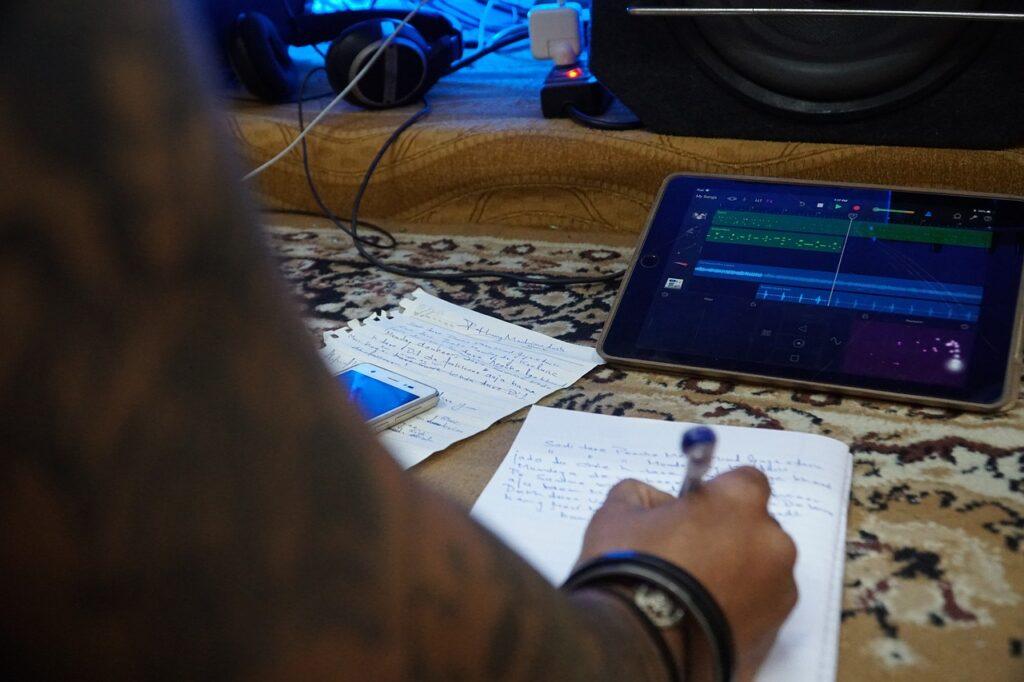Estimated reading time 3 minutes
Table of Contents
Introduction to "Where Do I Get Inspiration for My Lyrics?"
Have you ever stared at a blank page, trying to come up with a lyric idea? Do you ever ask, “Where do I get inspiration for my lyrics?” Look no further! I’ll give you three lyric writing starter ideas to help you get the juices flowing. Read more to learn how to get back on track with your writing.
Today’s lyric writing tips come from a songwriting workshop I did years ago. Martha Rogers, editor for the Boston Songwriters Workshop (BSW) Newsletter, writes, “Witty, corny, tender, commanding – these words begin to describe the kinds of plot lines, hooks, and rhymes people brainstormed during the BSW Collaboration Workshop…” (BSW Newsletter January 2000, 1). The next section discusses what we did at the Collaboration Workshop.
This post uses some technical words. See the definitions in the Glossary below.

"Where Do I Get Inspiration for My Lyrics?" and the BSW Collaboration Workshop
First, we broke up into groups of four or five people. I gave each group six pictures to look at. Their task: use one of the pictures to inspire a plot line.
Rogers comments, “The tales of woe, compassion, competition, and longing ranged from:
- “…the streets of urban poverty…”
- “…[a] beaver’s environmental home in the suburbs…”
- “…two women’s drama in a bar…”
- “…a fundraiser finding gold in a wedding band…”
As you can see, they invented several unique and interesting scenarios. Where do you get inspiration for your lyrics? Try this one:
The second task: Come up with song lyric hooks using place names from a city, nation, or continent. It didn’t even have to be a real place. It could be fictional, mythical, or interstellar.
Rodgers says, “People ‘went to town’ on this one:
- “Divine Providence”
- “I’m in a Napa Valley Daze”
- “Betcha Can in Ketchikan”
“Try it and see where it takes you!” (BSW Newsletter January 2000, 1).
The collaborators used their rhyming dictionaries for the third task. I gave them the line, “On a balmy, moonlit shoreline…” Then, they had to come up with a rhyme to complete the line.
Rodger writes, “In sharing, we clarified our understanding of the different kinds of rhymes and discussed the rhythmic accents from the original line” (BSW Newsletter January 2000, 1).
So, where do you get inspiration for your lyrics? Make a challenge for yourself like the ones above that I created for the Collaboration Workshop. Then, it’s just a matter of brainstorming.

Concluding Thoughts to “Where Do I Get Inspiration for My Lyrics?”
In addition to the kickstarter ideas, collaborating with another songwriter can be a good way to get inspiration for your lyrics. Rogers comments, “We all agreed that in collaboration we came up with material quite different from any one of us alone.” (BSW Newsletter January 2000, 1).
I’ll leave you with a quote from Pete Luboff, “The most important thing to keep in mind while writing alone or collaborating is that you’re writing because you love it and the purpose is to have a good time” (qtd. in The Craft and Business of Songwriting).
© 2022 Geoffrey Keith
Join me for online or in-person lessons today!
Glossary
How Do I Find the Key of a Song with Accidentals?
Do you need to figure out the key for a song? Whether you have sheet music or figure out a song by ear, it’ll be useful to know the key of a song. This will help when adding harmonies, improvising, memorizing, or for just generally understanding the music. Plus, you can find out if the music changes keys during the song. Keep reading to answer the question, “How do I find the key of a song with accidentals?” Estimated reading time 2 minutes.
Read MorePiano Major Scales (Basic Fingering Concepts)
Do you want to understand piano scale fingering concepts better? At their core, all piano scales are based upon a central concept that helps simplify the fingering. Keep reading for piano major scales - basic fingering concepts. Estimated reading time 2 minutes.
Read MoreHow to Color Code the Musical Form to Unlock LD & Special Needs Music Students’ Learning Potential
Do your students get confused by repeats and D.C. al fine? Reduce your students' confusion. Learn how to color code the musical form. Estimated reading time 2 minutes.
Read MoreHow to Learn Music Theory with a Learning Disability
Are you frustrated because music theory seems to be filled with arcane and unreachable knowledge? While learning music theory can present challenges for musicians with learning disabilities, it is possible to dispel the mystery surrounding how music works. Keep reading “How to Learn Music Theory with a Learning Disability” for study tips and music theory resources. Estimated reading time 3 minutes.
Read More




